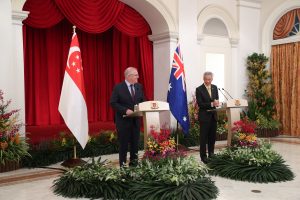Singapore’s Prime Minister Lee Hsien Loong has advised his Australian counterpart, Scott Morrison, to engage more calmly and directly with China, amid a historically frosty spell in relations between Canberra and Beijing. Morrison made a brief stop in Singapore yesterday night for a meeting with Lee, en route to the G-7-plus meetings in Cornwall, where he will hold his first in-person meeting with U.S. President Joe Biden.
In addition to discussing the potential for a travel bubble between the two countries, and the creation of a mutually recognizable digital COVID-19 vaccine certificate, Lee said that he and Morrison discussed a number of issues related to China.
Speaking to reporters after the meeting, Lee described China as “one of the biggest policy questions for every major power in the world” and said that he told Morrison that Australia should focus on areas of mutual interest rather than ideological differences.
“You don’t have to become like them, neither can you hope to make them become like you,” he said. “You have to be able to work on that basis, that this is a big world in which there are different countries, and work with others who are not completely like-minded but with whom you have many issues, where your interests do align.”
“There will be rough spots … and you have to deal with that,” Lee added. “But deal with them as issues in a partnership which you want to keep going and not issues, which add up to an adversary which you are trying to suppress.”
Over the past year, Australia’s relations with China have hit a decades-long nadir, as Beijing, angered by Morrison’s public call in April 2020 for an investigation into the origins of COVID-19, has punished Canberra by imposing billions of dollars worth of tariffs on a range of Australian goods and siccing its “wolf warrior” diplomatic corps on the Australian government. The standoff culminated in a list of 14 grievances released by Beijing, which sought to blame Australia for the deterioration in bilateral relations.
Lee has long presented himself as a peddler of hard truths to the United States and China, and his advice to Morrison echoed previous statements that he has made about the burgeoning Sino-American rivalry. In his keynote address to the 2019 Shangri-La defense conclave, the Singaporean leader urged the two superpowers to find common ground. While praising China’s growth as “a tremendous boon, both to itself and to the world,” he said that the Chinese leadership should seek to resolve maritime disputes “through diplomacy and compromise rather than force or the threat of force.”
Lee also said U.S. policymakers had to accept that China would continue to grow, “and that it is neither possible nor wise for them to prevent this from happening.” Instead, he called on Washington to forge “a new understanding that will integrate China’s aspirations within the current system of rules and norms.”
Implicit in Lee’s comments to Morrison was a criticism of the sharp turn in views of China that have taken place under his Coalition government, some of whose officials have in recent months begun speaking openly of war with China.
Earlier this week, Defense Minister Peter Dutton called for an increase in the number of American military personnel rotating through Australia’s Northern Territory and mooted having U.S. Navy vessels operate from a base near Perth in the country’s west, stating that Australia “must be prepared for any contingency.”
The former home affairs minister said Australia sought “a productive relationship with China – but we don’t accept breaking of the law, we don’t accept interference in our electoral process, we don’t accept interference in processes of democracy.”
The government’s critics claim that while the downturn in relations has been prompted to some degree by genuine issues of concern – from China’s maritime belligerence to its “wolf warrior diplomacy” and human rights in Hong Kong and Xinjiang – the threat posed by Chinese foreign interference is overblown, and that new legislation aimed at curbing such interference has significantly abridged civil rights in Australia.
Indeed, the particular tenor of the turn against China cannot be explained without reference to the enduring Australian fear of abandonment by the United States, a worry that was heightened amid the outrages and uncertainties of the Trump administration. As in the U.S., there is also domestic political utility for conservative politicians in striking strong “anti-China” positions.
In a recent series of three lengthy articles in the Australian Financial Review, the publication’s former deputy editor Max Suich argued that domestic political advantage is among the key drivers of Australia’s present China policy.
“While we dramatically changed our approach, we did not define a policy objective for the new relationship with China or a strategy to achieve it. Nor did we thoroughly review alternative options,” Suich wrote. “We elevated anger about Chinese activities in Australia and latent ministerial hostility towards China, turning threadbare slogans into policy.”

































